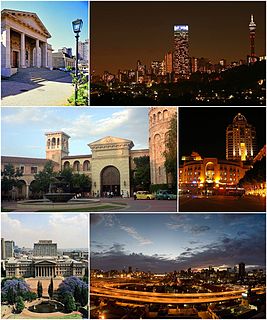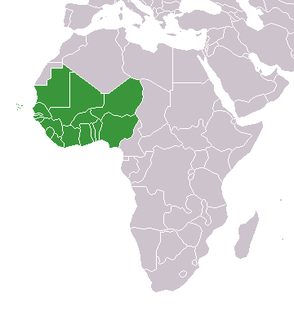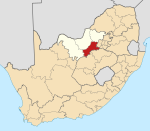
African Americans are an ethnic group of Americans with total or partial ancestry from any of the black racial groups of Africa. The term African American generally denotes descendants of enslaved black people who are from the United States, while some recent black immigrants or their children may also come to identify as African-American or may identify differently.

Afrikaans is a West Germanic language spoken in South Africa, Namibia and, to a lesser extent, Botswana, Zambia and Zimbabwe. It evolved from the Dutch vernacular of Holland spoken by the Dutch settlers in South Africa, where it gradually began to develop distinguishing characteristics in the course of the 18th century. Hence, it is a daughter language of Dutch, and the youngest of the Germanic languages as well as one of the youngest languages in general.
Black people is a racialized classification of people, usually a political and skin color-based category for specific populations with a mid to dark brown complexion. Not all people considered "black" have dark skin; in certain countries, often in socially based systems of racial classification in the Western world, the term "black" is used to describe persons who are perceived as dark-skinned compared to other populations. It is mostly used for people of Sub-Saharan African descent and the indigenous peoples of Oceania. Indigenous African societies do not use the term black as a racial identity outside of influences brought by Western cultures. The term "black" may or may not be capitalized. The AP Stylebook changed its guide to capitalize the "b" in black in 2020. The ASA Style Guide says that the "b" should not be capitalized.

The Central African Republic is a landlocked country in Central Africa. It is bordered by Chad to the north, Sudan to the northeast, South Sudan to the southeast, the Democratic Republic of the Congo to the south, the Republic of the Congo to the southwest and Cameroon to the west. The CAR covers a land area of about 620,000 square kilometres (240,000 sq mi) and had an estimated population of around 4.7 million as of 2018. As of 2021, the CAR is the scene of a civil war, ongoing since 2012.

Ghana, officially the Republic of Ghana, is a country in West Africa. It spans along the Gulf of Guinea and the Atlantic Ocean, sharing borders with the Ivory Coast in the west, Burkina Faso in the north, Togo in the east, the Gulf of Guinea and the Atlantic Ocean in the south. Ghana covers an area of 238,535 km2 (92,099 sq mi), with a population of 31 million. It is the second-most populous country in West Africa, after Nigeria; and Accra is its capital and largest city.

Liberia, officially the Republic of Liberia, is a country on the West African coast. It is bordered by Sierra Leone to its northwest, Guinea to its north, Ivory Coast to its east, and the Atlantic Ocean to its south-southwest. It has a population of around 5 million and covers an area of 111,369 square kilometers (43,000 sq mi). English is the official language, but over 20 indigenous languages are spoken, representing the numerous ethnic groups who make up more than 95% of the population. The country's capital and largest city is Monrovia.

Namibia, officially the Republic of Namibia, is a country in Southern Africa. Its western border is the Atlantic Ocean; it shares land borders with Zambia and Angola to the north, Botswana to the east and South Africa to the south and east. Although it does not border Zimbabwe, less than 200 metres of the Zambezi River separates the two countries. Namibia gained independence from South Africa on 21 March 1990, following the Namibian War of Independence. Its capital and largest city is Windhoek. Namibia is a member state of the United Nations (UN), the Southern African Development Community (SADC), the African Union (AU) and the Commonwealth of Nations.

Nigeria, officially the Federal Republic of Nigeria, is a country in West Africa. It borders Niger in the north, Chad in the northeast, Cameroon in the east, and Benin in the west. Its southern coast is on the Gulf of Guinea in the Atlantic Ocean. Nigeria is a federal republic comprising 36 states and the Federal Capital Territory, where the capital, Abuja, is located. Lagos, one of the largest metropolitan areas in the world, is the largest city in Nigeria and the continent of Africa.

Sub-Saharan Africa is, geographically and ethnoculturally, the area of the continent of Africa that lies south of the Sahara. According to the United Nations, it consists of all African countries and territories that are fully or partially south of the Sahara. While the United Nations geoscheme for Africa excludes Sudan from its definition of sub-Saharan Africa, the African Union's definition includes Sudan but instead excludes Mauritania.

Senegal, officially the Republic of Senegal, is a country in West Africa. Senegal is bordered by Mauritania in the north, Mali to the east, Guinea to the southeast, and Guinea-Bissau to the southwest. Senegal nearly surrounds The Gambia, a country occupying a narrow sliver of land along the banks of the Gambia River, which separates Senegal's southern region of Casamance from the rest of the country. Senegal also shares a maritime border with Cape Verde. Senegal's economic and political capital is Dakar.

Eswatini, officially the Kingdom of Eswatini, sometimes written in English as eSwatini, and formerly and still commonly known in English as Swaziland, is a landlocked country in Southern Africa. It is bordered by Mozambique to its northeast and South Africa to its north, west, and south. At no more than 200 kilometres (120 mi) north to south and 130 kilometres (81 mi) east to west, Eswatini is one of the smallest countries in Africa; despite this, its climate and topography are diverse, ranging from a cool and mountainous highveld to a hot and dry lowveld.

Tanzania, officially the United Republic of Tanzania, is a country in East Africa within the African Great Lakes region. It borders Uganda to the north; Kenya to the northeast; Comoro Islands and the Indian Ocean to the east; Mozambique and Malawi to the south; Zambia to the southwest; and Rwanda, Burundi, and the Democratic Republic of the Congo to the west. Mount Kilimanjaro, Africa's highest mountain, is in northeastern Tanzania.

The Atlantic slave trade, transatlantic slave trade, or Euro-American slave trade involved the transportation by slave traders of various enslaved African people, mainly to the Americas. The slave trade regularly used the triangular trade route and its Middle Passage, and existed from the 16th to the 19th centuries. The vast majority of those who were enslaved and transported in the transatlantic slave trade were people from Central and West Africa, who had been sold by other West Africans, or by half-European "merchant princes" to Western European slave traders, who brought them to the Americas. Except for the Portuguese, European slave traders generally did not participate in the raids because life expectancy for Europeans in sub-Saharan Africa was less than one year during the period of the slave trade. The South Atlantic and Caribbean economies were particularly dependent on labour for the production of sugarcane and other commodities. This was viewed as crucial by those Western European states that, in the late 17th and 18th centuries, were vying with each other to create overseas empires.

Johannesburg, informally known as Jozi,Joburg, or "The City of Gold", is the largest city in South Africa, classified as a megacity, and is one of the 50 largest urban areas in the world. It is the provincial capital and largest city of Gauteng, which is the wealthiest province in South Africa. Johannesburg is the seat of the Constitutional Court, the highest court in South Africa. Most of the major South African companies and banks have their head offices in Johannesburg. The city is located in the mineral-rich Witwatersrand range of hills and is the centre of large-scale gold and diamond trade. It was one of the host cities of the official tournament of the 2010 FIFA World Cup – and it hosted the final.

West Africa or Western Africa is the westernmost region of Africa. The United Nations defines Western Africa as the 17 countries of Benin, Burkina Faso, Cape Verde, The Gambia, Ghana, Guinea, Guinea-Bissau, Ivory Coast, Liberia, Mali, Mauritania, Niger, Nigeria, Senegal, Sierra Leone, and Togo, as well as the United Kingdom Overseas Territory of Saint Helena, Ascension and Tristan da Cunha. The population of West Africa is estimated at about 381 million people as of 2018, and at 381,981,000 as of 2017, of which 189,672,000 are female and 192,309,000 male.

Kenya, officially the Republic of Kenya, is a country in Eastern Africa. At 580,367 square kilometres (224,081 sq mi), Kenya is the world's 48th largest country by total area. With a population of more than 47.6 million people in the 2019 census, Kenya is the 29th most populous country. Kenya's capital and largest city is Nairobi, while its oldest city and first capital is the coastal city of Mombasa. Kisumu City is the third largest city and also an inland port on Lake Victoria. Other important urban centres include Nakuru and Eldoret. As of 2020, Kenya is the third largest economy in sub-Saharan Africa after Nigeria and South Africa. Kenya is bordered by South Sudan to the northwest, Ethiopia to the north, Somalia to the east, Uganda to the west, Tanzania to the south, and the Indian Ocean to the southeast.

Apartheid was a system of institutionalised racial segregation that existed in South Africa and South West Africa from 1948 until the early 1990s. Apartheid was characterised by an authoritarian political culture based on baasskap, which ensured that South Africa was dominated politically, socially, and economically by the nation's minority white population. According to this system of social stratification, white citizens had the highest status, followed by Asians and Coloureds, then black Africans. The economic legacy and social effects of apartheid continue to the present day.

Africa is the world's second-largest and second-most populous continent, after Asia in both cases. At about 30.3 million km2 including adjacent islands, it covers 6% of Earth's total surface area and 20% of its land area. With 1.3 billion people as of 2018, it accounts for about 16% of the world's human population. Africa's population is the youngest amongst all the continents; the median age in 2012 was 19.7, when the worldwide median age was 30.4. Despite a wide range of natural resources, Africa is the least wealthy continent per capita, in part due to geographic impediments, legacies of European colonization in Africa and the Cold War, undemocratic rule and deleterious policies. Despite this low concentration of wealth, recent economic expansion and the large and young population make Africa an important economic market in the broader global context.

South Africa, officially the Republic of South Africa (RSA), is the southernmost country in Africa. With over 59 million people, it is the world's 23rd-most populous nation and covers an area of 1,221,037 square kilometres. South Africa has three capital cities: executive Pretoria, judicial Bloemfontein and legislative Cape Town. The largest city is Johannesburg. About 80% of South Africans are of Black African ancestry, divided among a variety of ethnic groups speaking different African languages. The remaining population consists of Africa's largest communities of European, Asian, and Multiracial ancestry.

Nelson Rolihlahla Mandela was a South African anti-apartheid revolutionary, political leader and philanthropist who served as President of South Africa from 1994 to 1999. He was the country's first black head of state and the first elected in a fully representative democratic election. His government focused on dismantling the legacy of apartheid by tackling institutionalised racism and fostering racial reconciliation. Ideologically an African nationalist and socialist, he served as the president of the African National Congress (ANC) party from 1991 to 1997.





















